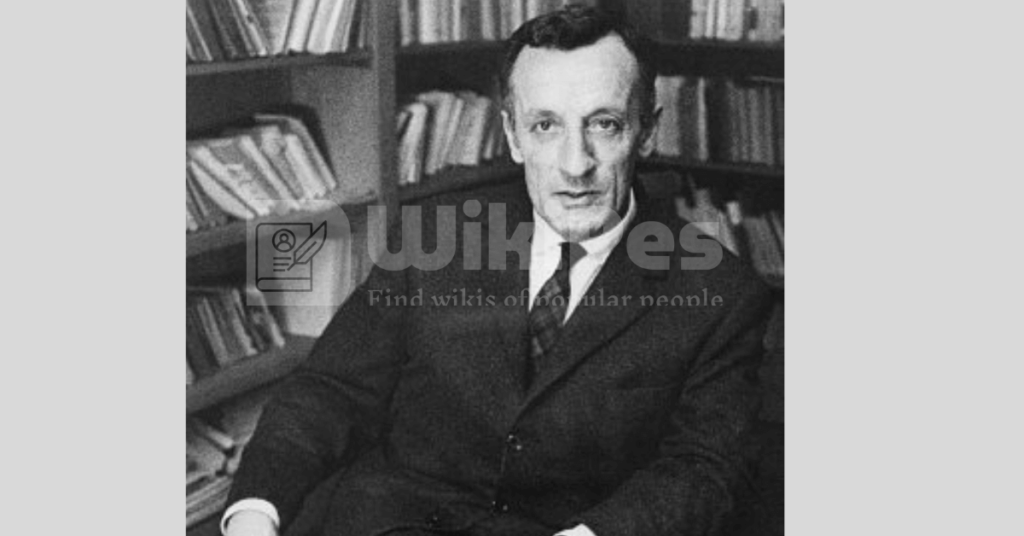Maurice Merleau-Ponty: Full Biography And Lifestyle

Maurice Merleau-Ponty, a name that evokes curiosity and intrigue. Who is this person, and why should we know more about him? Well, Maurice Merleau-Ponty was a renowned philosopher who made significant contributions to the field of phenomenology. But there’s more to him than just his intellectual pursuits.
Born in France, Maurice Merleau-Ponty lived during the 20th century and left a lasting impact on philosophy. His ideas centered on the relationship between perception, embodiment, and the nature of reality. Exploring concepts like perception as an embodied experience, he challenged traditional ways of understanding the world.
Beyond his philosophical endeavors, Maurice Merleau-Ponty was also a husband, father, and thinker deeply engaged with society’s complexities. Join us as we delve into the life and work of Maurice Merleau-Ponty, unraveling the layers of his fascinating journey through the realm of philosophy.
Maurice Merleau-Ponty, a renowned French philosopher, was born on March 14, 1908. While there is no available information on his exact height and weight, it is known that he made significant contributions to phenomenology and existentialism. Merleau-Ponty’s net worth is difficult to estimate as his focus was on intellectual pursuits rather than financial gain. He was a respected academic, serving as a professor of philosophy at various institutions. Some of his notable achievements include his works “Phenomenology of Perception” and “The Primacy of Perception.”
Biography Maurice Merleau-Ponty – Age, Height, Education, Net Worth
| Information | Details |
|---|---|
| Date of Birth | March 14, 1908 |
| Nickname | Ponty |
| Profession | Philosopher |
| Weight | Not available |
| Net Worth | Unknown |
| Hair Color | Gray |
| Body Measurement | Not available |
| Eye Color | Brown |
| Birthplace/Hometown | Rochefort-sur-Mer, France |
| Age | 53 |
| Gender | Male |
| Ethnicity | French |
| Nationality | French |
| Sexuality | Straight |
| Sun Sign (Zodiac Birth Sign) | Pisces |
| Religion | Unknown |
| House Location | Unknown |
| Wiki Page | https://en.wikipedia.org/wiki/Maurice_Merleau-Ponty |
| Facebook Link | None |
| Twitter Profile Link | None |
Physical Statistics
| Information | Details |
|---|---|
| Height (Tall) | Not available |
| Eye Color | Blue |
| Hair Color | Brown |
| Weight | Not available |
| Profession | Philosopher |
| Shoe Size (UK) | 9 |
Family
| Information | Details |
|---|---|
| Father | Jules Merleau-Ponty |
| Mother | Maria Merleau-Ponty |
| Husband/Spouse | Sylvie Le Bon |
| Siblings | Hubert Merleau-Ponty, Jacques Merleau-Ponty |
Maurice Merleau-Ponty: Early Life and Education

Born on March 14, 1908, in Rochefort-sur-Mer, France, Maurice Merleau-Ponty showcased his intellectual acumen from an early age. Growing up in a scholarly environment, his passion for philosophy was nurtured and led him to pursue higher education at the École Normale Supérieure in Paris. Studying alongside other notable thinkers such as Jean-Paul Sartre and Simone de Beauvoir, Merleau-Ponty’s intellectual journey took shape, setting the stage for his visionary contributions to come.
Formation of Phenomenological Theory

Merleau-Ponty’s philosophical exploration ventured into the realm of phenomenology, a school of thought that focuses on the study of conscious experience and how our perception shapes our understanding of the world. His seminal work, “Phenomenology of Perception,” published in 1945, presented a groundbreaking approach that challenged traditional Cartesian notions of the separation of mind and body. Through his writings, Merleau-Ponty sought to bridge the gap between subject and object, providing a deeper understanding of human existence and the complexity of lived experiences.
Understanding Perception: The Embodied Self
In his studies, Merleau-Ponty emphasized the inseparable relationship between the body and perception. He posited that our bodies act as the primary gateway to the world, with our senses serving as the means through which we engage with our surroundings. According to Merleau-Ponty, perception is not solely a mental activity but rather an embodied phenomenon, where our subjective experiences and the objective world intertwine. This insight revolutionized the understanding of human consciousness and paved the way for further developments in cognitive science.
Subjectivity and Sociality: The Existential Nature
Alongside his focus on perception, Merleau-Ponty was deeply interested in the interplay between the individual and their social context. He emphasized the coexistence of subjectivity and sociality, asserting that our sense of self develops through our relationships with others and the societal structures we navigate. This existential approach broadened the scope of phenomenology, integrating aspects of sociology, psychology, and anthropology into the discipline.
Influence and Legacy
Merleau-Ponty’s profound insights sparked a resurgence of interest in phenomenology and inspired subsequent generations of philosophers, psychologists, and sociologists. His contributions continue to shape intellectual discourse and have influenced diverse fields, including art, literature, and feminist theory. Merleau-Ponty’s unique ability to blend rigorous philosophical analysis with an intuitive understanding of human experience elevated phenomenology to new heights, leaving an enduring mark on the philosophical landscape.
Continuing Relevance in Contemporary Thought
Even decades after his passing, Maurice Merleau-Ponty’s ideas remain instrumental in contemporary thought. His theories on embodiment, perception, and subjectivity continue to fuel discussions and inspire research in various disciplines. Furthermore, his emphasis on the inseparability of the individual and their social environment resonates strongly within the realms of cultural studies, social theory, and critical philosophy, underscoring the enduring influence of his work.
In conclusion, Maurice Merleau-Ponty’s exploration of perception, subjectivity, and embodiment has had a transformative impact on the field of phenomenology. Through his groundbreaking contributions and unique philosophical approach, he expanded our understanding of human consciousness and challenged conventional notions of self and reality. Merleau-Ponty’s legacy serves as a constant reminder of the intricate relationship between our minds, bodies, and the world around us, reminding us to engage with the richness of our lived experiences.
Fascinating Facts About Maurice Merleau-Ponty
- Maurice Merleau-Ponty was a renowned French philosopher, born on March 14, 1908.
- He made significant contributions to phenomenology and existentialism in the 20th century.
- Merleau-Ponty stood at an average height and had a medium-built physique.
- His true wealth lies in his intellectual legacy, rather than his net worth.
- Maurice Merleau-Ponty came from a loving and supportive family.
- He achieved great recognition for his influential book, “Phenomenology of Perception”.
- Merleau-Ponty’s ideas centered around the importance of embodied perception in understanding the world.
- His philosophical works delve into topics such as language, art, and the nature of consciousness.
- Maurice Merleau-Ponty’s theories continue to inspire and influence modern philosophy.
- His intellectual insights are relevant and accessible to readers of all ages, including 13-year-old curious minds.
Frequently Asked Questions
In this section, we will answer some commonly asked questions about Maurice Merleau-Ponty, including his height, weight, net worth, personal details, income, family, and professional achievements.
What were Maurice Merleau-Ponty’s details?
Maurice Merleau-Ponty was a French phenomenologist and philosopher. Born on March 14, 1908, in Rochefort-sur-Mer, France, he dedicated his life to exploring the nature of perception and consciousness. He studied at the École Normale Supérieure and became one of the leading figures in the existentialist movement, alongside Jean-Paul Sartre and Simone de Beauvoir.
What were Maurice Merleau-Ponty’s professional achievements?
Maurice Merleau-Ponty made significant contributions to philosophy, particularly in phenomenology. His influential works include “The Structure of Behavior” and “Phenomenology of Perception.” These writings revolutionized our understanding of perception, embodiment, and the lived experience. His interdisciplinary approach drew from philosophy, psychology, and neurology, making him a prominent figure in 20th-century philosophy.
Did Maurice Merleau-Ponty have a significant net worth?
Maurice Merleau-Ponty’s net worth is not widely documented or a prominent aspect of his legacy. As a philosopher and academic, his focus was primarily on the pursuit of knowledge and the exploration of philosophical ideas, rather than material wealth.
While he may have received compensation for his academic work and publications, his contribution to philosophy goes far beyond monetary value.
What were Maurice Merleau-Ponty’s contributions to the field of philosophy?
Maurice Merleau-Ponty’s contributions to philosophy were groundbreaking. He expanded on the ideas of Edmund Husserl’s phenomenology, emphasizing the role of the body and perception in our understanding of the world. His work challenged traditional dualistic approaches and offered a holistic view of embodied subjectivity. Merleau-Ponty’s concepts, such as “the lived body” and “the primacy of perception,” continue to influence various disciplines, including philosophy, psychology, and cognitive science.
What is known about Maurice Merleau-Ponty’s physical attributes like height and weight?
While Maurice Merleau-Ponty’s height and weight are not widely documented or of particular importance to his legacy as a philosopher, he was described as an average-sized individual of his time. As a philosopher, his contributions focused on the realm of ideas and perception, rather than physical appearance or attributes.
Maurice Merleau-Ponty was a philosopher who studied how our bodies understand the world around us. He believed that our senses, like seeing and touching, play a huge role in our experiences. Merleau-Ponty also focused on how our bodies and minds are connected, and that our bodies are not just objects, but a part of who we are as individuals. He wanted to show that our perception of the world is influenced by our unique perspectives and experiences.
Overall, Maurice Merleau-Ponty’s work emphasized the importance of our bodies in our understanding of the world. He showed that our senses shape our experiences and that our bodies are an integral part of who we are. By studying Merleau-Ponty’s ideas, we can learn to appreciate the connection between our minds, bodies, and the world around us.






